Ethics and Sustainability in Global Business: A Report
VerifiedAdded on 2022/10/14
|9
|2577
|261
Report
AI Summary
This report delves into the critical aspects of ethics and sustainability within the globalized business environment. It begins with a literature review of ethical business decisions, exploring various ethical theories like utilitarianism and deontology, and the importance of corporate social responsibility and corporate governance. The report then presents a case study of Apple Inc., examining the company's ethical challenges and responses, including privacy issues, planned obsolescence, and corporate social responsibility initiatives. It further differentiates ethical considerations for small businesses, highlighting the influence of management's personal beliefs and the need for a formal code of conduct. The report concludes by emphasizing the significance of moral principles and ethical practices in modern business, referencing the discussed topics and case studies.

Sustainability and ethics
Paraphrase This Document
Need a fresh take? Get an instant paraphrase of this document with our AI Paraphraser

Contents
Introduction................................................................................................................................2
Ethical Business Decisions: A Literature Review.....................................................................2
Ethical Business Decisions in Apple..........................................................................................4
Ethics in Small Business............................................................................................................5
Conclusion..................................................................................................................................6
References..................................................................................................................................7
Introduction................................................................................................................................2
Ethical Business Decisions: A Literature Review.....................................................................2
Ethical Business Decisions in Apple..........................................................................................4
Ethics in Small Business............................................................................................................5
Conclusion..................................................................................................................................6
References..................................................................................................................................7
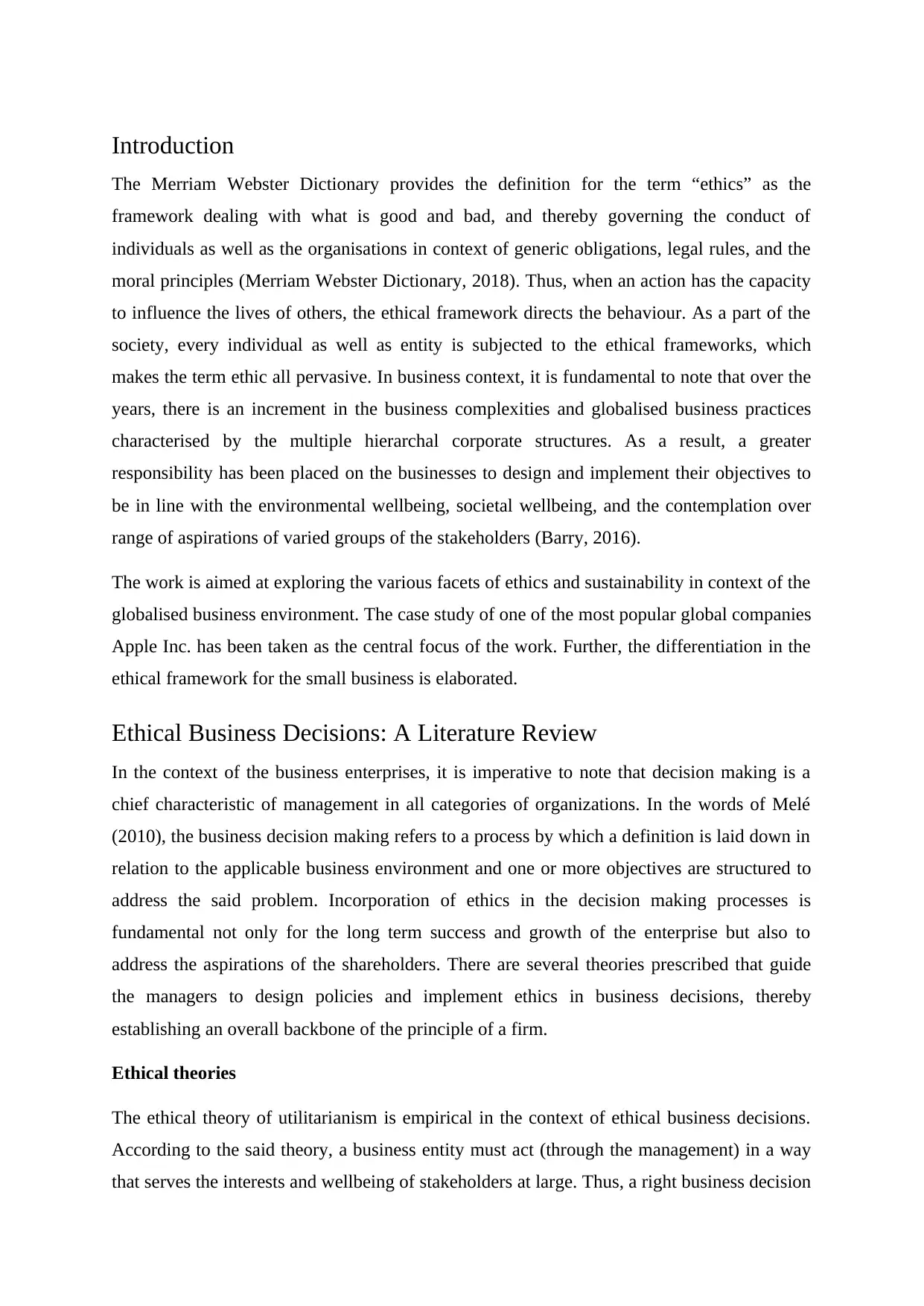
Introduction
The Merriam Webster Dictionary provides the definition for the term “ethics” as the
framework dealing with what is good and bad, and thereby governing the conduct of
individuals as well as the organisations in context of generic obligations, legal rules, and the
moral principles (Merriam Webster Dictionary, 2018). Thus, when an action has the capacity
to influence the lives of others, the ethical framework directs the behaviour. As a part of the
society, every individual as well as entity is subjected to the ethical frameworks, which
makes the term ethic all pervasive. In business context, it is fundamental to note that over the
years, there is an increment in the business complexities and globalised business practices
characterised by the multiple hierarchal corporate structures. As a result, a greater
responsibility has been placed on the businesses to design and implement their objectives to
be in line with the environmental wellbeing, societal wellbeing, and the contemplation over
range of aspirations of varied groups of the stakeholders (Barry, 2016).
The work is aimed at exploring the various facets of ethics and sustainability in context of the
globalised business environment. The case study of one of the most popular global companies
Apple Inc. has been taken as the central focus of the work. Further, the differentiation in the
ethical framework for the small business is elaborated.
Ethical Business Decisions: A Literature Review
In the context of the business enterprises, it is imperative to note that decision making is a
chief characteristic of management in all categories of organizations. In the words of Melé
(2010), the business decision making refers to a process by which a definition is laid down in
relation to the applicable business environment and one or more objectives are structured to
address the said problem. Incorporation of ethics in the decision making processes is
fundamental not only for the long term success and growth of the enterprise but also to
address the aspirations of the shareholders. There are several theories prescribed that guide
the managers to design policies and implement ethics in business decisions, thereby
establishing an overall backbone of the principle of a firm.
Ethical theories
The ethical theory of utilitarianism is empirical in the context of ethical business decisions.
According to the said theory, a business entity must act (through the management) in a way
that serves the interests and wellbeing of stakeholders at large. Thus, a right business decision
The Merriam Webster Dictionary provides the definition for the term “ethics” as the
framework dealing with what is good and bad, and thereby governing the conduct of
individuals as well as the organisations in context of generic obligations, legal rules, and the
moral principles (Merriam Webster Dictionary, 2018). Thus, when an action has the capacity
to influence the lives of others, the ethical framework directs the behaviour. As a part of the
society, every individual as well as entity is subjected to the ethical frameworks, which
makes the term ethic all pervasive. In business context, it is fundamental to note that over the
years, there is an increment in the business complexities and globalised business practices
characterised by the multiple hierarchal corporate structures. As a result, a greater
responsibility has been placed on the businesses to design and implement their objectives to
be in line with the environmental wellbeing, societal wellbeing, and the contemplation over
range of aspirations of varied groups of the stakeholders (Barry, 2016).
The work is aimed at exploring the various facets of ethics and sustainability in context of the
globalised business environment. The case study of one of the most popular global companies
Apple Inc. has been taken as the central focus of the work. Further, the differentiation in the
ethical framework for the small business is elaborated.
Ethical Business Decisions: A Literature Review
In the context of the business enterprises, it is imperative to note that decision making is a
chief characteristic of management in all categories of organizations. In the words of Melé
(2010), the business decision making refers to a process by which a definition is laid down in
relation to the applicable business environment and one or more objectives are structured to
address the said problem. Incorporation of ethics in the decision making processes is
fundamental not only for the long term success and growth of the enterprise but also to
address the aspirations of the shareholders. There are several theories prescribed that guide
the managers to design policies and implement ethics in business decisions, thereby
establishing an overall backbone of the principle of a firm.
Ethical theories
The ethical theory of utilitarianism is empirical in the context of ethical business decisions.
According to the said theory, a business entity must act (through the management) in a way
that serves the interests and wellbeing of stakeholders at large. Thus, a right business decision
⊘ This is a preview!⊘
Do you want full access?
Subscribe today to unlock all pages.

Trusted by 1+ million students worldwide
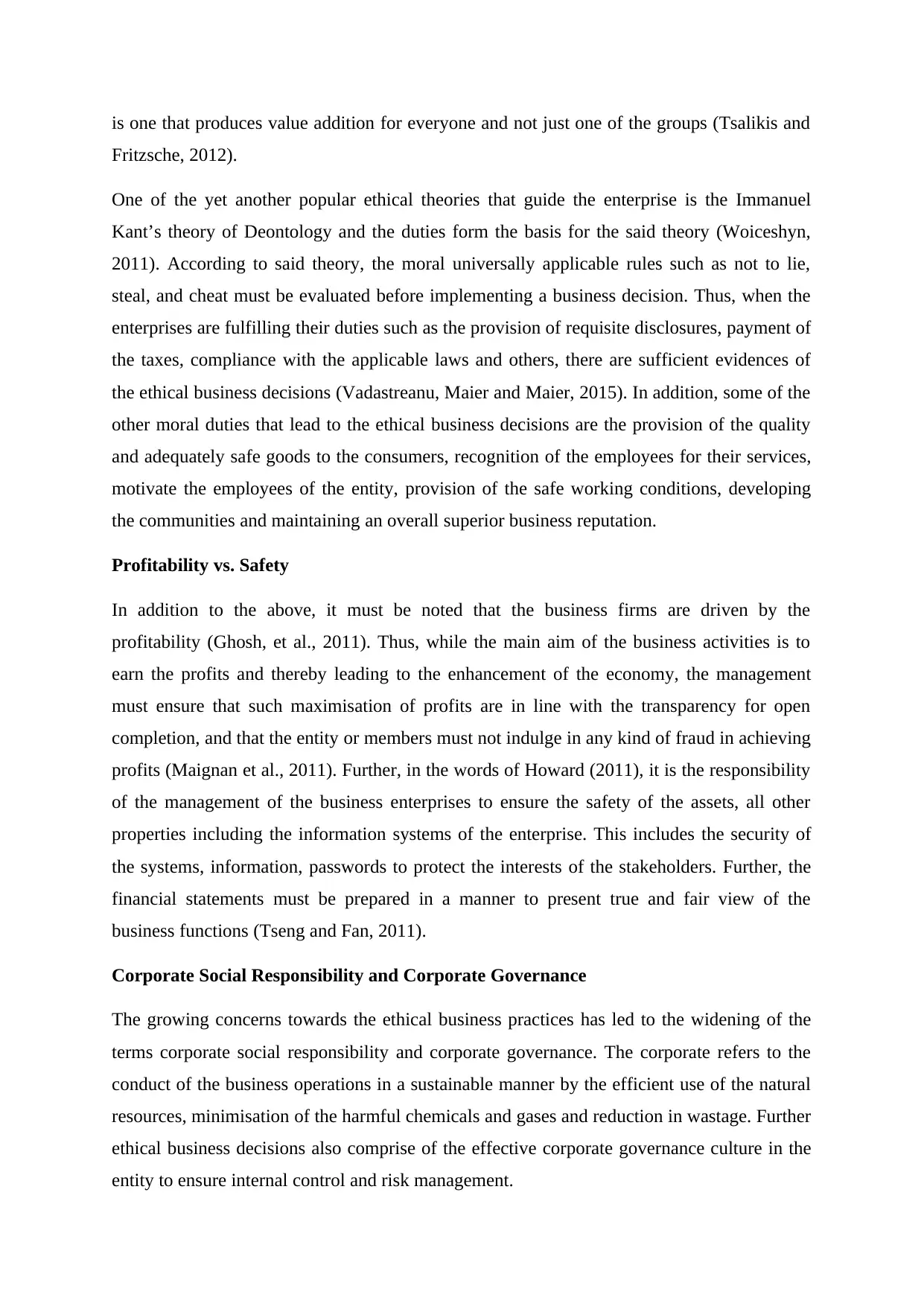
is one that produces value addition for everyone and not just one of the groups (Tsalikis and
Fritzsche, 2012).
One of the yet another popular ethical theories that guide the enterprise is the Immanuel
Kant’s theory of Deontology and the duties form the basis for the said theory (Woiceshyn,
2011). According to said theory, the moral universally applicable rules such as not to lie,
steal, and cheat must be evaluated before implementing a business decision. Thus, when the
enterprises are fulfilling their duties such as the provision of requisite disclosures, payment of
the taxes, compliance with the applicable laws and others, there are sufficient evidences of
the ethical business decisions (Vadastreanu, Maier and Maier, 2015). In addition, some of the
other moral duties that lead to the ethical business decisions are the provision of the quality
and adequately safe goods to the consumers, recognition of the employees for their services,
motivate the employees of the entity, provision of the safe working conditions, developing
the communities and maintaining an overall superior business reputation.
Profitability vs. Safety
In addition to the above, it must be noted that the business firms are driven by the
profitability (Ghosh, et al., 2011). Thus, while the main aim of the business activities is to
earn the profits and thereby leading to the enhancement of the economy, the management
must ensure that such maximisation of profits are in line with the transparency for open
completion, and that the entity or members must not indulge in any kind of fraud in achieving
profits (Maignan et al., 2011). Further, in the words of Howard (2011), it is the responsibility
of the management of the business enterprises to ensure the safety of the assets, all other
properties including the information systems of the enterprise. This includes the security of
the systems, information, passwords to protect the interests of the stakeholders. Further, the
financial statements must be prepared in a manner to present true and fair view of the
business functions (Tseng and Fan, 2011).
Corporate Social Responsibility and Corporate Governance
The growing concerns towards the ethical business practices has led to the widening of the
terms corporate social responsibility and corporate governance. The corporate refers to the
conduct of the business operations in a sustainable manner by the efficient use of the natural
resources, minimisation of the harmful chemicals and gases and reduction in wastage. Further
ethical business decisions also comprise of the effective corporate governance culture in the
entity to ensure internal control and risk management.
Fritzsche, 2012).
One of the yet another popular ethical theories that guide the enterprise is the Immanuel
Kant’s theory of Deontology and the duties form the basis for the said theory (Woiceshyn,
2011). According to said theory, the moral universally applicable rules such as not to lie,
steal, and cheat must be evaluated before implementing a business decision. Thus, when the
enterprises are fulfilling their duties such as the provision of requisite disclosures, payment of
the taxes, compliance with the applicable laws and others, there are sufficient evidences of
the ethical business decisions (Vadastreanu, Maier and Maier, 2015). In addition, some of the
other moral duties that lead to the ethical business decisions are the provision of the quality
and adequately safe goods to the consumers, recognition of the employees for their services,
motivate the employees of the entity, provision of the safe working conditions, developing
the communities and maintaining an overall superior business reputation.
Profitability vs. Safety
In addition to the above, it must be noted that the business firms are driven by the
profitability (Ghosh, et al., 2011). Thus, while the main aim of the business activities is to
earn the profits and thereby leading to the enhancement of the economy, the management
must ensure that such maximisation of profits are in line with the transparency for open
completion, and that the entity or members must not indulge in any kind of fraud in achieving
profits (Maignan et al., 2011). Further, in the words of Howard (2011), it is the responsibility
of the management of the business enterprises to ensure the safety of the assets, all other
properties including the information systems of the enterprise. This includes the security of
the systems, information, passwords to protect the interests of the stakeholders. Further, the
financial statements must be prepared in a manner to present true and fair view of the
business functions (Tseng and Fan, 2011).
Corporate Social Responsibility and Corporate Governance
The growing concerns towards the ethical business practices has led to the widening of the
terms corporate social responsibility and corporate governance. The corporate refers to the
conduct of the business operations in a sustainable manner by the efficient use of the natural
resources, minimisation of the harmful chemicals and gases and reduction in wastage. Further
ethical business decisions also comprise of the effective corporate governance culture in the
entity to ensure internal control and risk management.
Paraphrase This Document
Need a fresh take? Get an instant paraphrase of this document with our AI Paraphraser
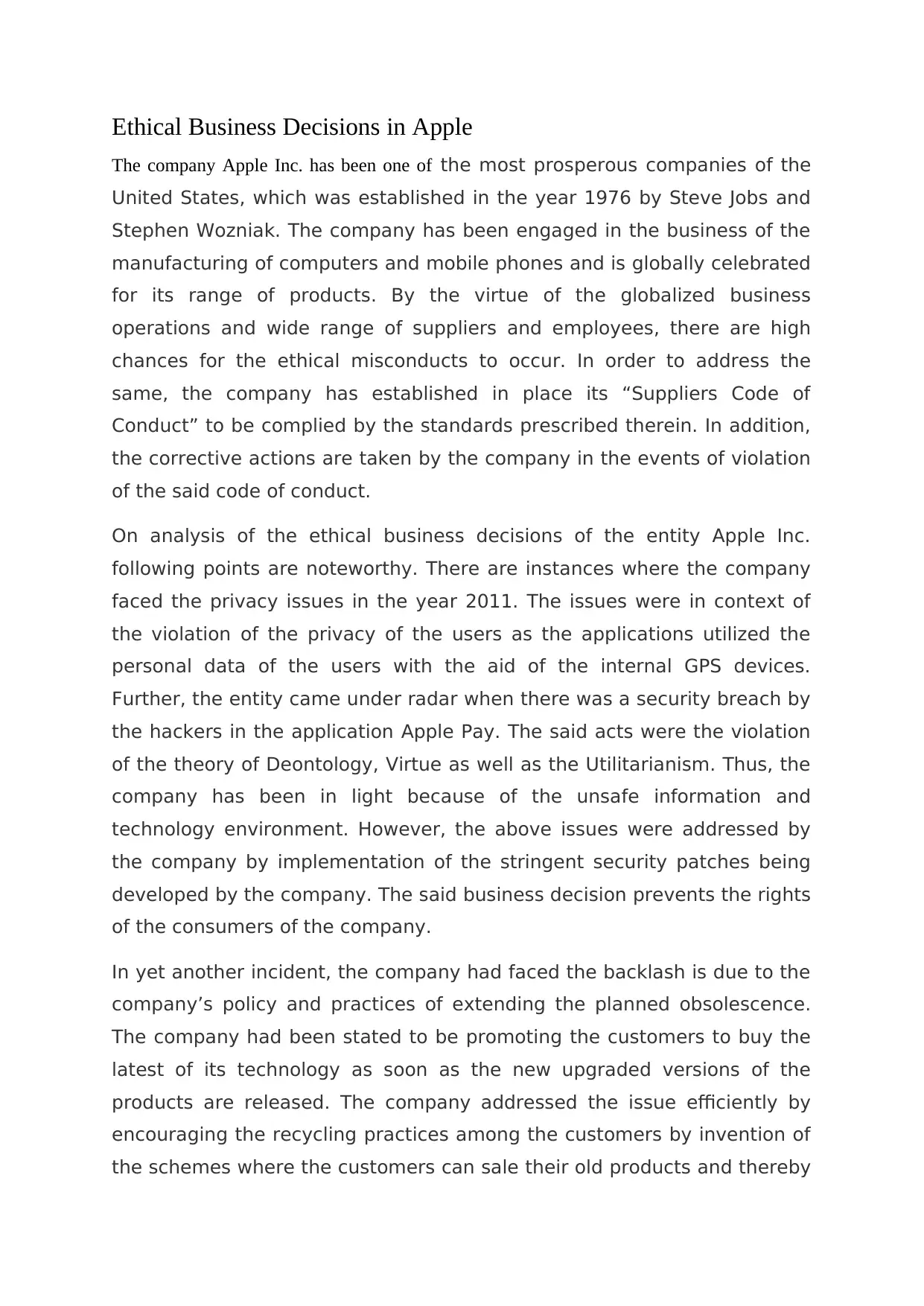
Ethical Business Decisions in Apple
The company Apple Inc. has been one of the most prosperous companies of the
United States, which was established in the year 1976 by Steve Jobs and
Stephen Wozniak. The company has been engaged in the business of the
manufacturing of computers and mobile phones and is globally celebrated
for its range of products. By the virtue of the globalized business
operations and wide range of suppliers and employees, there are high
chances for the ethical misconducts to occur. In order to address the
same, the company has established in place its “Suppliers Code of
Conduct” to be complied by the standards prescribed therein. In addition,
the corrective actions are taken by the company in the events of violation
of the said code of conduct.
On analysis of the ethical business decisions of the entity Apple Inc.
following points are noteworthy. There are instances where the company
faced the privacy issues in the year 2011. The issues were in context of
the violation of the privacy of the users as the applications utilized the
personal data of the users with the aid of the internal GPS devices.
Further, the entity came under radar when there was a security breach by
the hackers in the application Apple Pay. The said acts were the violation
of the theory of Deontology, Virtue as well as the Utilitarianism. Thus, the
company has been in light because of the unsafe information and
technology environment. However, the above issues were addressed by
the company by implementation of the stringent security patches being
developed by the company. The said business decision prevents the rights
of the consumers of the company.
In yet another incident, the company had faced the backlash is due to the
company’s policy and practices of extending the planned obsolescence.
The company had been stated to be promoting the customers to buy the
latest of its technology as soon as the new upgraded versions of the
products are released. The company addressed the issue efficiently by
encouraging the recycling practices among the customers by invention of
the schemes where the customers can sale their old products and thereby
The company Apple Inc. has been one of the most prosperous companies of the
United States, which was established in the year 1976 by Steve Jobs and
Stephen Wozniak. The company has been engaged in the business of the
manufacturing of computers and mobile phones and is globally celebrated
for its range of products. By the virtue of the globalized business
operations and wide range of suppliers and employees, there are high
chances for the ethical misconducts to occur. In order to address the
same, the company has established in place its “Suppliers Code of
Conduct” to be complied by the standards prescribed therein. In addition,
the corrective actions are taken by the company in the events of violation
of the said code of conduct.
On analysis of the ethical business decisions of the entity Apple Inc.
following points are noteworthy. There are instances where the company
faced the privacy issues in the year 2011. The issues were in context of
the violation of the privacy of the users as the applications utilized the
personal data of the users with the aid of the internal GPS devices.
Further, the entity came under radar when there was a security breach by
the hackers in the application Apple Pay. The said acts were the violation
of the theory of Deontology, Virtue as well as the Utilitarianism. Thus, the
company has been in light because of the unsafe information and
technology environment. However, the above issues were addressed by
the company by implementation of the stringent security patches being
developed by the company. The said business decision prevents the rights
of the consumers of the company.
In yet another incident, the company had faced the backlash is due to the
company’s policy and practices of extending the planned obsolescence.
The company had been stated to be promoting the customers to buy the
latest of its technology as soon as the new upgraded versions of the
products are released. The company addressed the issue efficiently by
encouraging the recycling practices among the customers by invention of
the schemes where the customers can sale their old products and thereby
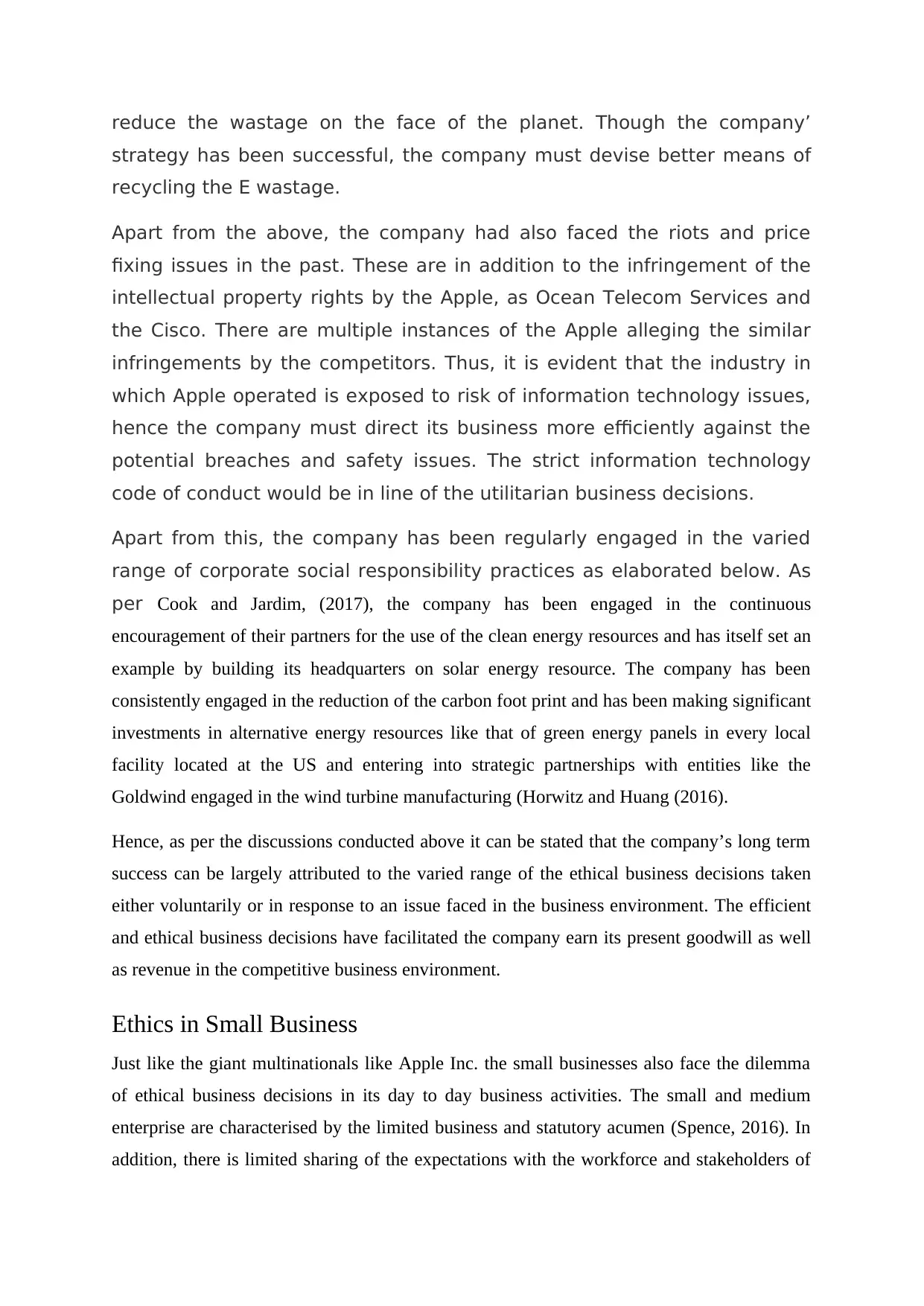
reduce the wastage on the face of the planet. Though the company’
strategy has been successful, the company must devise better means of
recycling the E wastage.
Apart from the above, the company had also faced the riots and price
fixing issues in the past. These are in addition to the infringement of the
intellectual property rights by the Apple, as Ocean Telecom Services and
the Cisco. There are multiple instances of the Apple alleging the similar
infringements by the competitors. Thus, it is evident that the industry in
which Apple operated is exposed to risk of information technology issues,
hence the company must direct its business more efficiently against the
potential breaches and safety issues. The strict information technology
code of conduct would be in line of the utilitarian business decisions.
Apart from this, the company has been regularly engaged in the varied
range of corporate social responsibility practices as elaborated below. As
per Cook and Jardim, (2017), the company has been engaged in the continuous
encouragement of their partners for the use of the clean energy resources and has itself set an
example by building its headquarters on solar energy resource. The company has been
consistently engaged in the reduction of the carbon foot print and has been making significant
investments in alternative energy resources like that of green energy panels in every local
facility located at the US and entering into strategic partnerships with entities like the
Goldwind engaged in the wind turbine manufacturing (Horwitz and Huang (2016).
Hence, as per the discussions conducted above it can be stated that the company’s long term
success can be largely attributed to the varied range of the ethical business decisions taken
either voluntarily or in response to an issue faced in the business environment. The efficient
and ethical business decisions have facilitated the company earn its present goodwill as well
as revenue in the competitive business environment.
Ethics in Small Business
Just like the giant multinationals like Apple Inc. the small businesses also face the dilemma
of ethical business decisions in its day to day business activities. The small and medium
enterprise are characterised by the limited business and statutory acumen (Spence, 2016). In
addition, there is limited sharing of the expectations with the workforce and stakeholders of
strategy has been successful, the company must devise better means of
recycling the E wastage.
Apart from the above, the company had also faced the riots and price
fixing issues in the past. These are in addition to the infringement of the
intellectual property rights by the Apple, as Ocean Telecom Services and
the Cisco. There are multiple instances of the Apple alleging the similar
infringements by the competitors. Thus, it is evident that the industry in
which Apple operated is exposed to risk of information technology issues,
hence the company must direct its business more efficiently against the
potential breaches and safety issues. The strict information technology
code of conduct would be in line of the utilitarian business decisions.
Apart from this, the company has been regularly engaged in the varied
range of corporate social responsibility practices as elaborated below. As
per Cook and Jardim, (2017), the company has been engaged in the continuous
encouragement of their partners for the use of the clean energy resources and has itself set an
example by building its headquarters on solar energy resource. The company has been
consistently engaged in the reduction of the carbon foot print and has been making significant
investments in alternative energy resources like that of green energy panels in every local
facility located at the US and entering into strategic partnerships with entities like the
Goldwind engaged in the wind turbine manufacturing (Horwitz and Huang (2016).
Hence, as per the discussions conducted above it can be stated that the company’s long term
success can be largely attributed to the varied range of the ethical business decisions taken
either voluntarily or in response to an issue faced in the business environment. The efficient
and ethical business decisions have facilitated the company earn its present goodwill as well
as revenue in the competitive business environment.
Ethics in Small Business
Just like the giant multinationals like Apple Inc. the small businesses also face the dilemma
of ethical business decisions in its day to day business activities. The small and medium
enterprise are characterised by the limited business and statutory acumen (Spence, 2016). In
addition, there is limited sharing of the expectations with the workforce and stakeholders of
⊘ This is a preview!⊘
Do you want full access?
Subscribe today to unlock all pages.

Trusted by 1+ million students worldwide
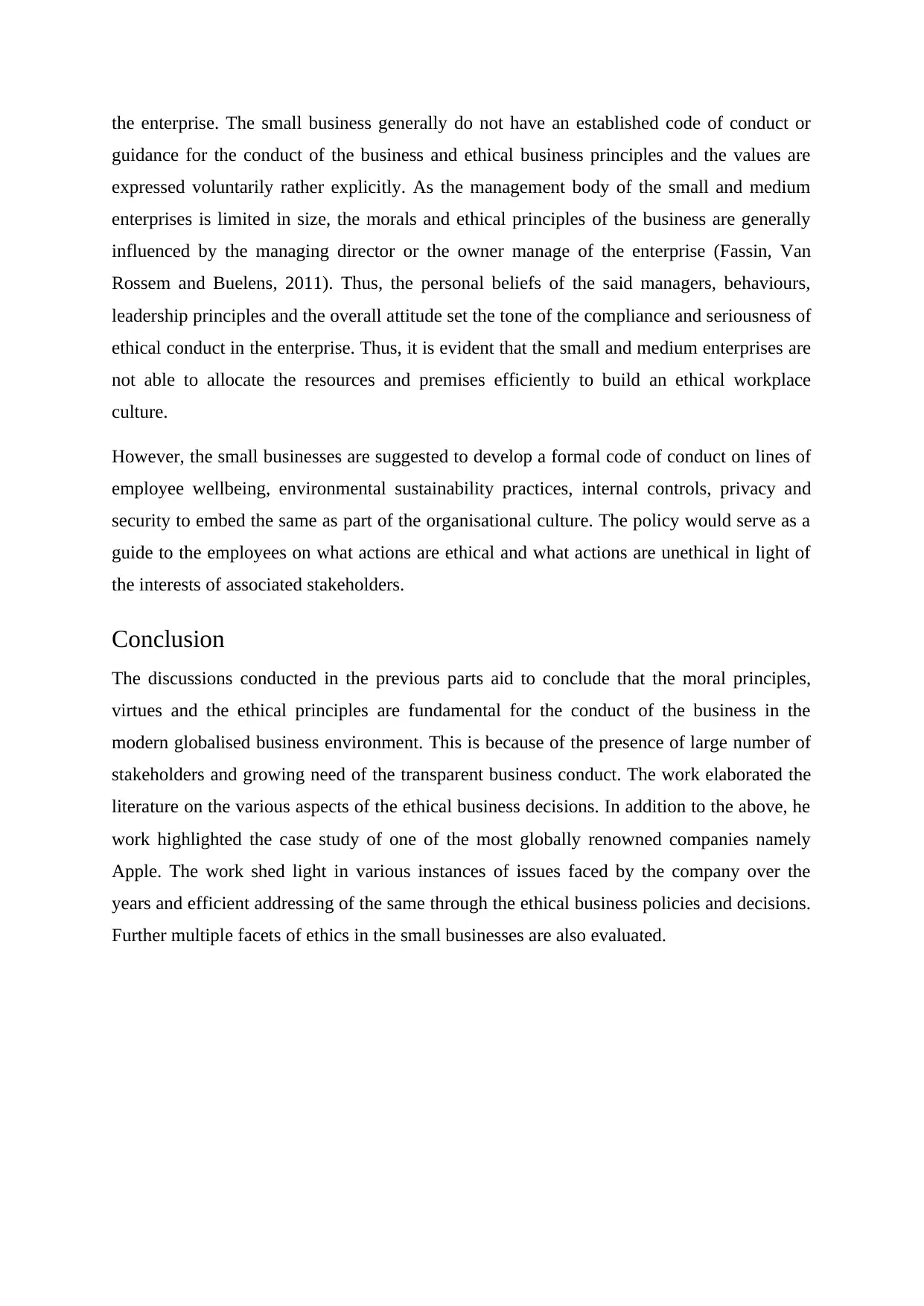
the enterprise. The small business generally do not have an established code of conduct or
guidance for the conduct of the business and ethical business principles and the values are
expressed voluntarily rather explicitly. As the management body of the small and medium
enterprises is limited in size, the morals and ethical principles of the business are generally
influenced by the managing director or the owner manage of the enterprise (Fassin, Van
Rossem and Buelens, 2011). Thus, the personal beliefs of the said managers, behaviours,
leadership principles and the overall attitude set the tone of the compliance and seriousness of
ethical conduct in the enterprise. Thus, it is evident that the small and medium enterprises are
not able to allocate the resources and premises efficiently to build an ethical workplace
culture.
However, the small businesses are suggested to develop a formal code of conduct on lines of
employee wellbeing, environmental sustainability practices, internal controls, privacy and
security to embed the same as part of the organisational culture. The policy would serve as a
guide to the employees on what actions are ethical and what actions are unethical in light of
the interests of associated stakeholders.
Conclusion
The discussions conducted in the previous parts aid to conclude that the moral principles,
virtues and the ethical principles are fundamental for the conduct of the business in the
modern globalised business environment. This is because of the presence of large number of
stakeholders and growing need of the transparent business conduct. The work elaborated the
literature on the various aspects of the ethical business decisions. In addition to the above, he
work highlighted the case study of one of the most globally renowned companies namely
Apple. The work shed light in various instances of issues faced by the company over the
years and efficient addressing of the same through the ethical business policies and decisions.
Further multiple facets of ethics in the small businesses are also evaluated.
guidance for the conduct of the business and ethical business principles and the values are
expressed voluntarily rather explicitly. As the management body of the small and medium
enterprises is limited in size, the morals and ethical principles of the business are generally
influenced by the managing director or the owner manage of the enterprise (Fassin, Van
Rossem and Buelens, 2011). Thus, the personal beliefs of the said managers, behaviours,
leadership principles and the overall attitude set the tone of the compliance and seriousness of
ethical conduct in the enterprise. Thus, it is evident that the small and medium enterprises are
not able to allocate the resources and premises efficiently to build an ethical workplace
culture.
However, the small businesses are suggested to develop a formal code of conduct on lines of
employee wellbeing, environmental sustainability practices, internal controls, privacy and
security to embed the same as part of the organisational culture. The policy would serve as a
guide to the employees on what actions are ethical and what actions are unethical in light of
the interests of associated stakeholders.
Conclusion
The discussions conducted in the previous parts aid to conclude that the moral principles,
virtues and the ethical principles are fundamental for the conduct of the business in the
modern globalised business environment. This is because of the presence of large number of
stakeholders and growing need of the transparent business conduct. The work elaborated the
literature on the various aspects of the ethical business decisions. In addition to the above, he
work highlighted the case study of one of the most globally renowned companies namely
Apple. The work shed light in various instances of issues faced by the company over the
years and efficient addressing of the same through the ethical business policies and decisions.
Further multiple facets of ethics in the small businesses are also evaluated.
Paraphrase This Document
Need a fresh take? Get an instant paraphrase of this document with our AI Paraphraser
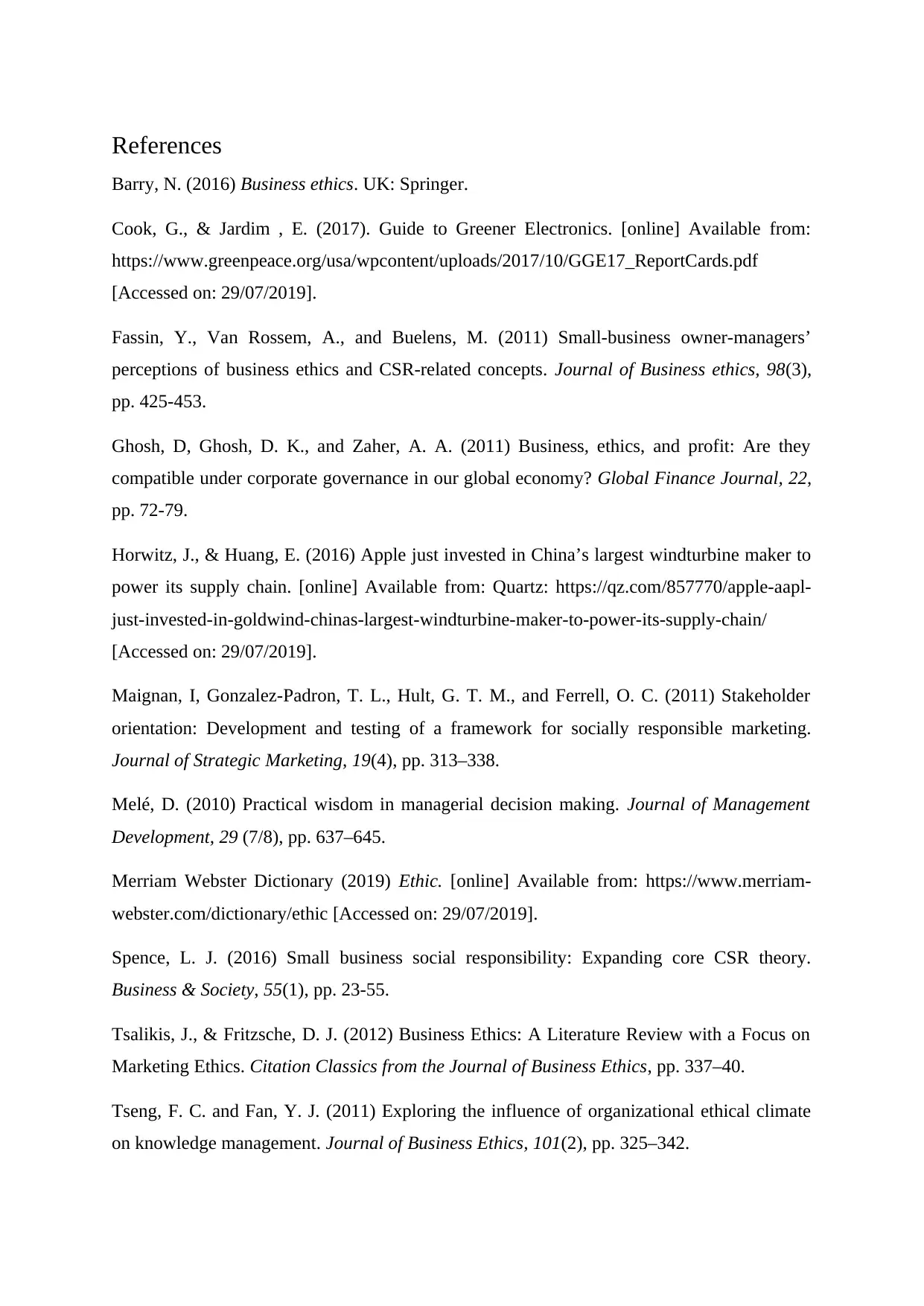
References
Barry, N. (2016) Business ethics. UK: Springer.
Cook, G., & Jardim , E. (2017). Guide to Greener Electronics. [online] Available from:
https://www.greenpeace.org/usa/wpcontent/uploads/2017/10/GGE17_ReportCards.pdf
[Accessed on: 29/07/2019].
Fassin, Y., Van Rossem, A., and Buelens, M. (2011) Small-business owner-managers’
perceptions of business ethics and CSR-related concepts. Journal of Business ethics, 98(3),
pp. 425-453.
Ghosh, D, Ghosh, D. K., and Zaher, A. A. (2011) Business, ethics, and profit: Are they
compatible under corporate governance in our global economy? Global Finance Journal, 22,
pp. 72-79.
Horwitz, J., & Huang, E. (2016) Apple just invested in China’s largest windturbine maker to
power its supply chain. [online] Available from: Quartz: https://qz.com/857770/apple-aapl-
just-invested-in-goldwind-chinas-largest-windturbine-maker-to-power-its-supply-chain/
[Accessed on: 29/07/2019].
Maignan, I, Gonzalez-Padron, T. L., Hult, G. T. M., and Ferrell, O. C. (2011) Stakeholder
orientation: Development and testing of a framework for socially responsible marketing.
Journal of Strategic Marketing, 19(4), pp. 313–338.
Melé, D. (2010) Practical wisdom in managerial decision making. Journal of Management
Development, 29 (7/8), pp. 637–645.
Merriam Webster Dictionary (2019) Ethic. [online] Available from: https://www.merriam-
webster.com/dictionary/ethic [Accessed on: 29/07/2019].
Spence, L. J. (2016) Small business social responsibility: Expanding core CSR theory.
Business & Society, 55(1), pp. 23-55.
Tsalikis, J., & Fritzsche, D. J. (2012) Business Ethics: A Literature Review with a Focus on
Marketing Ethics. Citation Classics from the Journal of Business Ethics, pp. 337–40.
Tseng, F. C. and Fan, Y. J. (2011) Exploring the influence of organizational ethical climate
on knowledge management. Journal of Business Ethics, 101(2), pp. 325–342.
Barry, N. (2016) Business ethics. UK: Springer.
Cook, G., & Jardim , E. (2017). Guide to Greener Electronics. [online] Available from:
https://www.greenpeace.org/usa/wpcontent/uploads/2017/10/GGE17_ReportCards.pdf
[Accessed on: 29/07/2019].
Fassin, Y., Van Rossem, A., and Buelens, M. (2011) Small-business owner-managers’
perceptions of business ethics and CSR-related concepts. Journal of Business ethics, 98(3),
pp. 425-453.
Ghosh, D, Ghosh, D. K., and Zaher, A. A. (2011) Business, ethics, and profit: Are they
compatible under corporate governance in our global economy? Global Finance Journal, 22,
pp. 72-79.
Horwitz, J., & Huang, E. (2016) Apple just invested in China’s largest windturbine maker to
power its supply chain. [online] Available from: Quartz: https://qz.com/857770/apple-aapl-
just-invested-in-goldwind-chinas-largest-windturbine-maker-to-power-its-supply-chain/
[Accessed on: 29/07/2019].
Maignan, I, Gonzalez-Padron, T. L., Hult, G. T. M., and Ferrell, O. C. (2011) Stakeholder
orientation: Development and testing of a framework for socially responsible marketing.
Journal of Strategic Marketing, 19(4), pp. 313–338.
Melé, D. (2010) Practical wisdom in managerial decision making. Journal of Management
Development, 29 (7/8), pp. 637–645.
Merriam Webster Dictionary (2019) Ethic. [online] Available from: https://www.merriam-
webster.com/dictionary/ethic [Accessed on: 29/07/2019].
Spence, L. J. (2016) Small business social responsibility: Expanding core CSR theory.
Business & Society, 55(1), pp. 23-55.
Tsalikis, J., & Fritzsche, D. J. (2012) Business Ethics: A Literature Review with a Focus on
Marketing Ethics. Citation Classics from the Journal of Business Ethics, pp. 337–40.
Tseng, F. C. and Fan, Y. J. (2011) Exploring the influence of organizational ethical climate
on knowledge management. Journal of Business Ethics, 101(2), pp. 325–342.
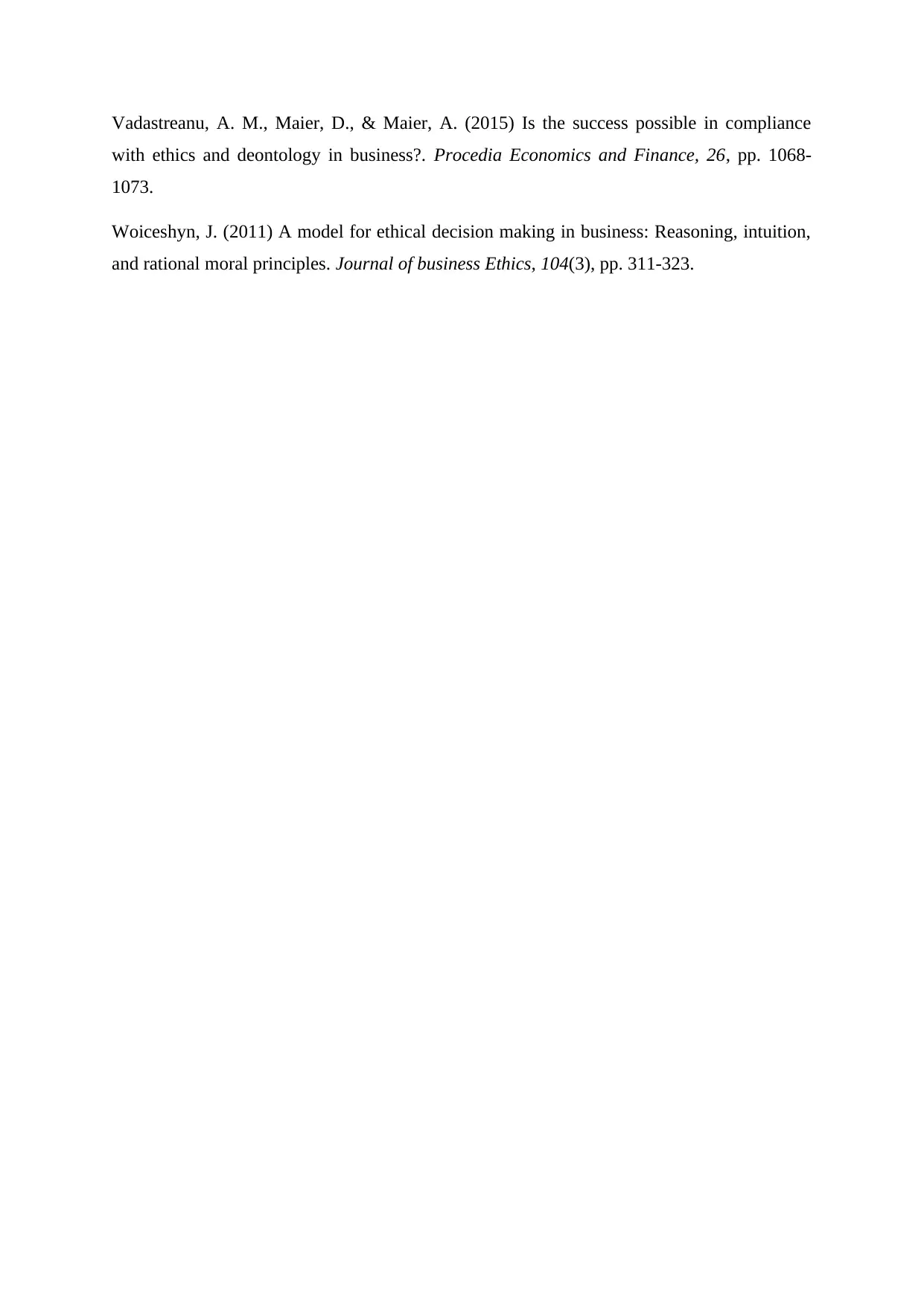
Vadastreanu, A. M., Maier, D., & Maier, A. (2015) Is the success possible in compliance
with ethics and deontology in business?. Procedia Economics and Finance, 26, pp. 1068-
1073.
Woiceshyn, J. (2011) A model for ethical decision making in business: Reasoning, intuition,
and rational moral principles. Journal of business Ethics, 104(3), pp. 311-323.
with ethics and deontology in business?. Procedia Economics and Finance, 26, pp. 1068-
1073.
Woiceshyn, J. (2011) A model for ethical decision making in business: Reasoning, intuition,
and rational moral principles. Journal of business Ethics, 104(3), pp. 311-323.
⊘ This is a preview!⊘
Do you want full access?
Subscribe today to unlock all pages.

Trusted by 1+ million students worldwide
1 out of 9
Related Documents
Your All-in-One AI-Powered Toolkit for Academic Success.
+13062052269
info@desklib.com
Available 24*7 on WhatsApp / Email
![[object Object]](/_next/static/media/star-bottom.7253800d.svg)
Unlock your academic potential
Copyright © 2020–2026 A2Z Services. All Rights Reserved. Developed and managed by ZUCOL.




